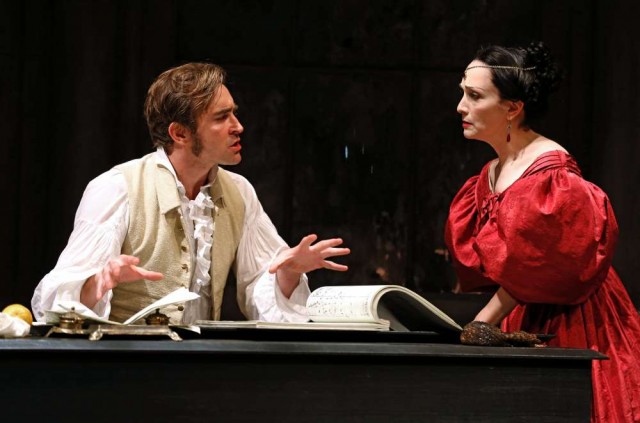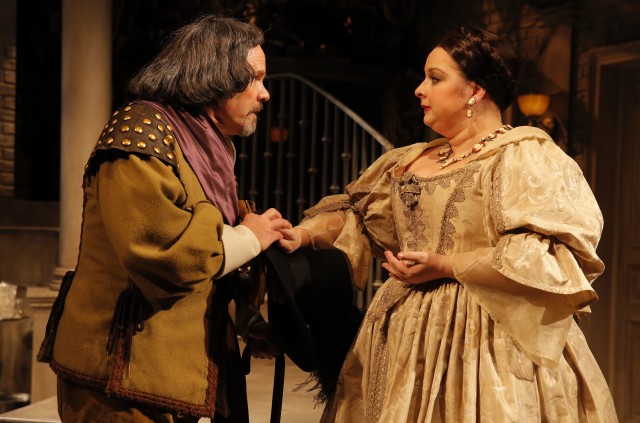
Sicilian composer Vincenzo Bellini (Lee Pace) and diva Maria Malibran (Bebe Neuwirth) discuss art and love in Terrence McNally’s GOLDEN AGE (photo by Joan Marcus)
Manhattan Theatre Club
New York City Center Stage 1
Through January 13, $85
www.goldenageplay.com
In It’s Only a Play, Terrence McNally took audiences behind the scenes of a Broadway production’s opening night. In The Lisbon Traviata and Master Class, McNally focused on opera star Maria Callas. He brings those two themes together in the light but charming Golden Age. Sicilian composer Vincenzo Bellini (Lee Pace) is presenting the world premiere of I puritani on January 24, 1835, at the Théâtre-Italien in Paris, the first of his operas to open outside Italy. The composer of such previous triumphs as I Capuleti e i Montecchi, La sonnambula, and Norma is joined by a quartet of popular singers who just might be as famous as he is: baritone Antonio Tamburini (Lorenzo Pisoni), who continually stuffs vegetables down his pants to enhance his manhood; soprano Giulia Grisi (Dierdre Friel), who cannot decide how much jewelry to wear when she takes the stage; bass Luigi Lablache (Ethan Phillips), who laments the always minor roles given to those of his vocal range; and tenor Giovanni Battista Rubini (Eddie Kaye Thomas), who is preparing to hit a high F-natural above high C that has never before been achieved. At Bellini’s side is his biographer and lover, Francesco Florimo (Will Rogers).

Luigi Lablache (Ethan Phillips) and Giulia Grisi (Dierdre Friel) get serious during premiere of Bellini’s I PURITANI (photo by Joan Marcus)
Tony-winning director Walter Bobbie (Venus in Fur, Chicago) has the four Puritans move from individual dressing rooms to backstage area (where Bellini makes use of a piano) and then up steps to the opera hall on Santo Loquasto’s dramatic set, their singing “voices” heard in the background as those still downstairs discuss the French versus the Italians (and the English), egotistically praise their own talents, debate whether the composer or singer is more important, and wonder about who is in the audience, from rival composers such as Donizetti and Rossini (George Morfogen) to such other opera stars as Giovanni Matteo Mario and Maria Malibran (Bebe Neuwirth). When the Malibran does indeed show up, the talk turns to love, romance, and heartbreak as well. Combining factual events with his vivid imagination, four-time Tony winner McNally (Frankie and Johnny in the Clair de Lune, Love! Valour! Compassion!) investigates the nature of art and its very creation in Golden Age, exploring inspiration, influence, and truth. What is occurring backstage often mimics what is happening in the opera itself, especially as Grisi gets ready for her mad scene and various characters declare their love for others. The acting is exemplary throughout, ranging from appropriately bombastic to somewhat more subdued, with Neuwirth a standout as she poetically recites a song by Bellini. And McNally and Bobbie have crafted Golden Age in such a way that the audience doesn’t need to know anything about opera, or be an opera fan at all, in order to enjoy this inside look at a magical moment in time.